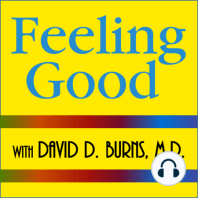84 min listen

385: Ask David: Do you have a "self" or "personality?" And more.
385: Ask David: Do you have a "self" or "personality?" And more.
ratings:
Length:
47 minutes
Released:
Feb 26, 2024
Format:
Podcast episode
Description
Do we have a "Self"? Or "Personality"? What's the best way to combat Should Statements? Is TEAM effective without a therapist? What's the Difference between Positive Reframing and Positive Thoughts? Note: The answers below were written by David prior to the podcast, just to give some structure to the discussion. Keep in mind that the actual live discussion by Rhonda, Matt and David will often go in different directions with different information and opinions. So, please listen to the podcast for the more complete answers! Questions for today’s Ask David Podcast: Stefan asks if we have a “self” or a “personality.” Slash wants to know how to combat a “Should Statement.” Magellan asks about the effectiveness of TEAM without the guidance of a therapist. Werner asks about the differences between Positive Reframing and the Positive Thoughts you record on the Daily Mood Log. 1. Stefan asks if we have a “self” or a “personality.” What is the so-called “Great Death” of the “self,” referred to in Buddhism? Hi David, I really love your work, both the books and the podcast you’ve created. Lots of great tools there. I think your down-to-earth approach is effective and great in de-mythologizing mental health care. Still, one thing has been bugging me about your approach: the fact that you quite casually seem to discount the existence of the self. As a theologian I understand this position. In discounting the self as a construct, you’ll open the way to less resistance and more acceptance. I studied both Christianity and some Buddhism, and in that tradition the self is essentially something to let go of as an illusion. I think you called this the death of the ego, and it’s common in many mystical currents both within and without the major religious traditions. However, by embracing this tradition in a therapeutic setting, I think there’s a great risk to gloss over long-held implicit beliefs or patterns in the construction of a personality that might hold people back from reaching their full potential. More specifically, I’m talking about schemas or Lifetraps (in the terminology of Jeffrey E. Young and Janet S. Klosko). I know Aaron Beck supports their work to address these “chronic self-defeating personality patterns” that are usually considered the be part of the self. What’s your take on their work? Kind regards, Stefan David’s reply Hi Stefan, Personality, like "self" is not a "thing," but just the observations that different people have different behavioral patterns. So, some are more outgoing, for example, while others are more introverted and shy and insecure. The only meaning of "self" is the context in which the word appears. So, "behave yourself" simply means that you are misbehaving and need to stop! Can you come to the Sunday hike is a question. It does not need the add on, "and do you plan to bring you 'self.'" The only meaning of any word is the context, and many uses in the English language, or any language. Nouns do not always refer to "things." Words are just sounds that come out of our mouths. I don't go into this much because few people "get it." Thanks so much, Stefan. Warmly, david PS The above is my take on Wittgenstein's Philosophical investigations, published after he died in 1950. . Second PS I had a random and fairly weak thought, but here it is. When doing my daily “slogging” a while back, I was going through a pleasant and familiar path and noticing how beautiful everything was, and had the thought, “This land is so valuable and expensive, and I’m SO GLAD I don’t have to own it. It would involve a nightmare of paper work, taxes and all kinds of worries. But I can just enjoy it without any of those burdens of ownership. Then I thought of the “self,” and what a heavy burden it is to “have one,” and worry about whether or not it is “good enough,” or “inferior,” and so forth. Selves tend to be a bit overweight, and heavy to carry around. And how much more fun, beautiful, and rewarding life is without having to ha
Released:
Feb 26, 2024
Format:
Podcast episode